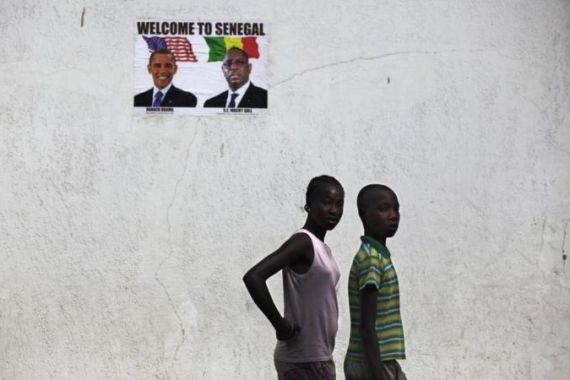Obama trips on Senegal’s democracy
The Senegalese government likely hopes the president’s visit will deepen economic cooperation with the United States.

US President Barack Obama’s trip to the westernmost corner of the African continent won’t be the first time the US has sent high-level delegations to Senegal.
In 1961, then Vice President Lyndon Baines Johnson visited the country when Leopold Sedar Senghor – the poet, visionary and co-founder of the Negritude movement – was president of Senegal.
Senghor himself made several state visits to the US, including one with President John F Kennedy. Presidents Bill Clinton and George W Bush were welcomed in Dakar by the Senegalese people and government as the two countries forged closer ties.
Nevertheless, to many, Obama’s trip to the continent has been a long time coming. Africans have wondered why the first black American president, the son of a Kenyan man, would take so long to make an extended, purposeful trip to the continent.
Indeed, apart from his trip to Egypt – considered as an attempt to rekindle ties with the Muslim world and the Middle East – and his brief layover in Ghana in 2009, Obama was expected to visit other African countries during his first term.
|
|
| Inside Story: Obama in Africa: Too little, too late? |
While we can only speculate as to the reasons why he did not, there is basis to believe that Obama was purposefully trying to avoid feeding political detractors keen to label him as an imposter and an outsider. It would appear that he needed to avert any blatant and obvious association with the African continent that would distract him from managing his domestic concerns, not least of which was a debilitating economic crisis.
Meanwhile, China has made major inroads into the continent, billions of dollars worth of investments that has seemingly tilted the scales. It would seem perfectly natural that Obama would want to use this chance to catch up and tap into the continent’s enormous economic resources.
Of course, why the president chose Senegal, out of a continent of 54 countries, is the next obvious question.
But on closer inspection, there are a number of factors accounting for the choice, especially considering Obama’s concern about good governance, accountability and the promotion of democracy.
The Senegalese people peacefully cast their votes last year to elect a new president in an election which was fraught with danger and threats as the ousted president, Abdoulaye Wade, gave no sign of fair play in 2012. At the time, there existed a legitimate fear that power would be confiscated, that the constitution would be undermined.
But once again, in their long political history, the Senegalese people managed a perilous situation with dignity. The new president, Macky Sall, is now engaged in far-reaching reforms for more transparency in the management of public affairs: a few key political leaders of the Wade regime including his own son, Karim, are now in jail for financial malpractice, the Senegalese administration will soon be undergoing thorough reforms to be better-equipped to serve the people, and the president has made several calls for managers and political leaders in the country to be more accountable and more frugal with public funds.
The ‘gateway to West Africa’
Senegal, because of its geographical position, is dubbed the gateway to West Africa.
And Senegal’s Goree Island – dubbed ”the door of no return” – was a major transit point for the slave trade where just a few centuries ago, millions of West Africans were forcefully shipped to the Americas to toil and moil in the sugar cane and corn plantation fields. It is estimated that some 12 million Africans left the continent as slaves.
Goree is a pilgrimage site where all visitors, especially African Americans, feel compelled to visit in Senegal to commemorate those taken four centuries ago to alien lands.
President Obama and First Lady Michelle Obama will of course visit this landmark as well, a symbolic gesture following in the footsteps of civil rights activist Jesse Jackson, South Africa’s iconic leader Nelson Mandela and the late Pope John Paul II.
Yet no analysis of Obama’s visit would be complete without considering the ongoing developments in Mali, a neighbouring country grappling with al-Qaeda fighters and other rebel groups in the north.
Peacekeeping missions and conflict resolution initiatives are essential tools of the Senegalese army as far back as the early 1960s, when Senegalese troops were sent to deal with the crisis in Congo following the mutiny in Patrice Lumumba’s government. Today, Senegalese troops can be found in almost every United Nations peace mission; it is worth noting that Senegal also sided with the US Army during Operation Desert Storm launched against Iraq in 1991.
With concerns over safety and safety only growing both inside and outside the US, it is unsurprising that the US would want to partner with the Senegalese security forces in a bid to further their interests.
While in many ways, the US is hoping to secure and consolidate a fruitful relationship, especially considering the complex political realities in the West African region, there is little doubt that that the Senegalese government is hoping the visit will facilitate and deepen economic cooperation and investments with the US.
Ousmane Sene is the director of the West African Research Center in Dakar, Senegal.
